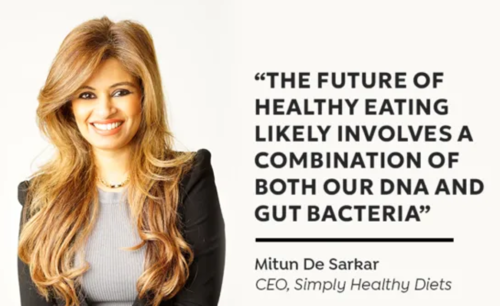In an exclusive conversation conducted by MedEdge MEA, CEO of Simply Healthy Diets and Fitness, Mitun De Sarkar discusses healthy eating. Learn the subject matter of mindful eating, the effects of food apps, and the intriguing genetics-health relationship. Gain insightful knowledge for a healthy earth and robust well-being.
MedEdge MEA: How can food apps and trackers help healthy eating today?
Mitun De Sarkar: In a growing awareness era where consumers are curious to know what they are consuming; Food apps and trackers can be valuable tools for promoting healthy eating habits and provide support in several ways. These apps allow users to track their food intake. This helps individuals meet their nutritional needs and identify any gaps in their nutritional requirements.
Many food apps provide calorie-tracking features. By tracking their calorie intake, users can better understand their eating habits and adjust as needed which improves their chances of losing weight. Some apps offer meal planning features, allowing users to plan their meals, make healthier food choices and stick to their dietary goals.
Many food apps provide educational resources, such as articles and recipes, that can help users learn more about nutrition and make informed choices about their diet. Some food apps have community support that allows users to connect with others who are also trying to eat healthily. This can provide motivation and support, making it easier for individuals to stick to their dietary goals.
MedEdge: How can we enjoy global flavours while making healthy sustainable choices?
MDS: If you are adventurous with cuisines, it is possible to enjoy global flavours and make healthy choices.Look for recipes from different cultures and cuisines such as Japanese, mediterranean, and Indian that feature vegetables, whole grains, and lean proteins. They can all align with healthy eating guidelines. Similarly, Plant-based ingredients like beans, lentils, vegetables, fruits, nuts, and seeds are often central to many global cuisines.
When choosing animal proteins, opt for sustainably sourced seafood, poultry, and grass-fed or pasture-raised meats. You can even try plant-based protein sources like tofu, tempeh, or legumes as well. Whenever possible, choose locally sourced and ethically produced ingredients. This supports local farmers and reduces the environmental impact of your food choices.
MedEdge: Is the future of healthy eating in our DNA or gut bacteria?
MDS: The future of healthy eating likely involves a combination of both our DNA and gut bacteria, as both play important roles in our overall health and how we process food. DNA can influence how our bodies metabolize different nutrients and how we respond to certain foods. Genetic factors can affect things like food intolerances, sensitivities, and nutrient requirements. Understanding our genetic predispositions can help tailor our diets to better suit our individual needs.
The Gut microbiome, which is the collection of bacteria and other microorganisms on the other hand plays a crucial role in digestion, nutrient absorption, and overall health. The composition of our gut microbiome can be influenced by the foods we eat. A diverse and balanced microbiome is associated with better health outcomes.
MedEdge: How can we eat healthy while supporting a healthy planet?
MDS: Plant-based diets tend to have a lower environmental impact than diets high in animal products. So, 60% of the time I prefer incorporating plant-based foods. Reduce the carbon footprint of your food by choosing locally grown and seasonal produce by local farmers. This also helps you eat fresher foods that are more nutritious due to less travel time, exposure to the environment and stocking up on supermarket shelves.
 Mitun De Sarkar, CEO of Simply Healthy Diets and Fitness.
Mitun De Sarkar, CEO of Simply Healthy Diets and Fitness.
Food waste contributes to greenhouse gas emissions and is a significant environmental issue. Plan your meals, store food properly, and use leftovers creatively to reduce food waste. Minimise plastic packaging. Opt recyclable packaging to reduce waste or use reusable packaging. Choose filtered water over bottled water to reduce plastic waste.
MedEdge: What changes can we make in food policies to make healthy eating easier?
MDS: Nutrition labeling of ingredients with added sugars, salt, and additives will make it easier for consumers to understand what they are eating and help them make healthier choices. Encourage local farmers to grow more fruits, vegetables and make hot affordable to consumers. They in return should be offered subsidies or incentives for taking this step by the government.
Implement restrictions on the marketing of unhealthy foods especially to children. Also, Improve the nutritional quality of meals served at school cafeterias to instill healthy eating habits in children from a young age. Increase education and awareness about healthy eating through public health campaigns and nutrition education programs with registered and licensed dietitians and nutritionists.
The discussion provides a broad perspective on everything from the influence of food apps to the sustainable consumption of international flavors to the comprehension of the relationship between heredity and health. Mitun’s advice on promoting a healthy planet via thoughtful food choices and recommendations for changing dietary restrictions highlight the significance of both individual and group actions for a prosperous present and a sustainable future. These discoveries provide a compass for navigating the changing nutritional terrain and promoting a world that is healthier and more mindful.
Source: mededgemea.com





